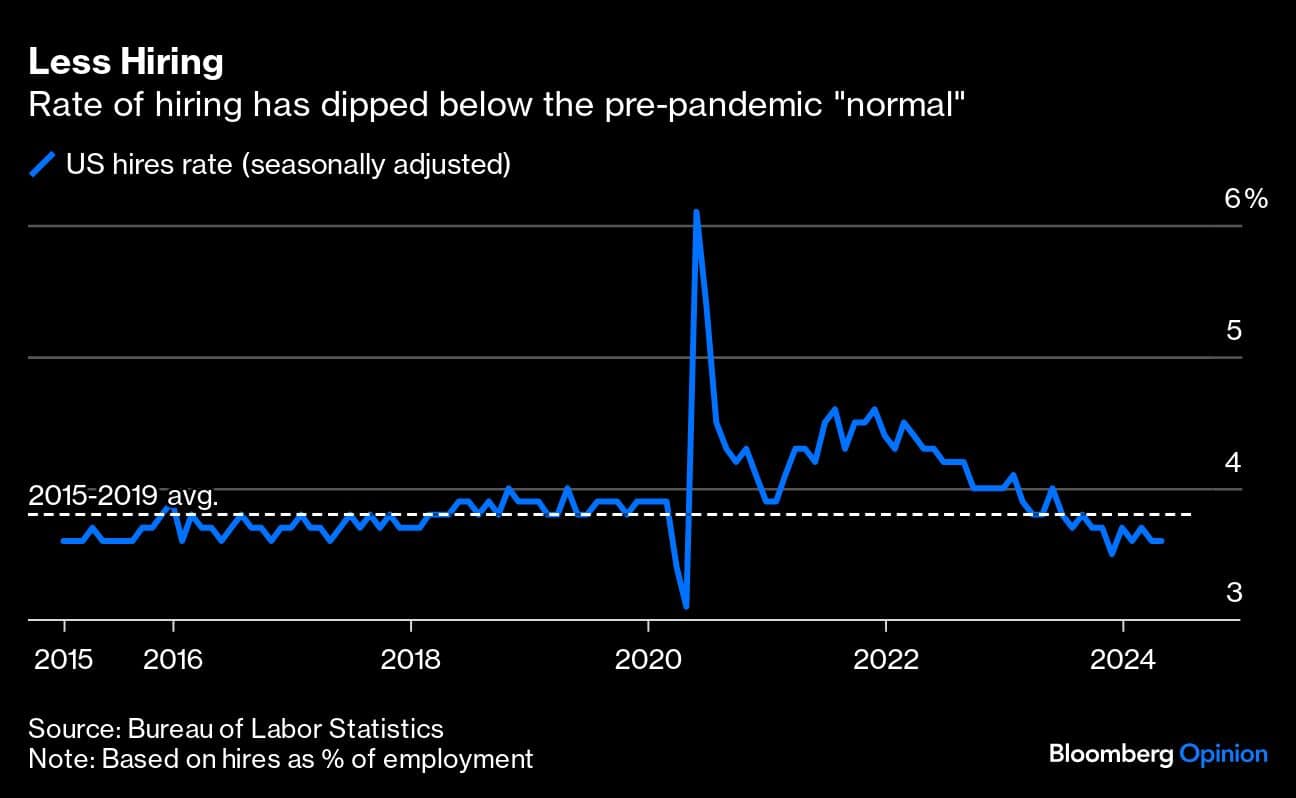



It’s a challenging time to be a college graduate entering the labour force. Outside of the early pandemic months, the ratio of new hires to total employees is near the lowest in the past decade. Many companies recruited too heavily during the frenzied pandemic economy, and now they’ve slowed hiring, particularly in well-paying fields such as finance and technology.

While companies aren’t firing many people, it’s clearly getting tougher to be on the outside of the labour market looking in, especially as a college graduate with high expectations and little concrete experience. On Handshake, a search platform for college students, internship listings were down more than 7% in the past 12 months compared with the same period the previous year. Each internship received an average of 93 applications, up from 53 the previous year, according to a Handshake analysis provided to Bloomberg News’ Jo Constantz. Business Insider reported that Goldman Sachs Group Inc. received 315,126 applicants for just 2,700 summer internship spots, a record-low 0.9% acceptance rate that makes it significantly more selective than, for instance, Harvard University.
Instead of despairing, recent grads and rising seniors can improve their employment prospects by staying open-minded and nimble.
Consider my experience in the late aughts. After working as a paralegal and toying with law school, I started seriously looking for a journalism job around the time the US was entering a recession in 2008 — an infamously bad labour market. When an acquaintance of a guy who knew another guy in my alumni network told me that Bloomberg News was looking for a freelance economics and government reporter in La Paz, Bolivia, I took it — basically because it sounded like a cool adventure. (I had just intermediate Spanish and had never been to the coup-prone Andean nation, but I got the impression that there weren’t many other applicants.) Within 18 months, it led to a full-time job in Mexico City; another job writing about big M&A deals in Brazil; a management position in Miami; and, ultimately, the gig writing this column.
Bolivia isn’t for every young gringo, of course. My point is that tough labor markets are for taking chances. If the job market seems impenetrable, take the foot-in-the-door job that no one else wants.
Second, don’t fixate on a single narrow career path. I, of course, felt like I made out well by being extraordinarily flexible about geography, but there are lots of ways to broaden your options, including different industries. The US Census Bureau’s Post-Secondary Employment Outcomes data reminds us that college majors aren’t binding determinants of where your career will take you. Philosophy majors rarely end up being philosophers, and even business majors and engineers end up in an extraordinarily diverse set of careers and cities.
With developments in artificial intelligence and work-from-anywhere, the workplace is shape-shifting before our eyes, so find the places where the best and most-interesting opportunities are and learn on the job.
Lastly, remember that the situation probably isn’t as bad as you’ve heard, and challenging labour markets rarely last forever. Bureau of Labor Statistics data show that unemployment among graduates age 20-24 has indeed been running at persistently elevated levels for a few years now, and it appears to have drifted slightly higher in recent months.

Some part of that is probably the broad business cycle, but some other part seems to reflect unique dynamics among college graduates. Bachelor’s degree holders are now experiencing slightly more unemployment than their peers with only “some college” or an associates degree — a set of circumstance that the economist Guy Berger of the Burning Glass Institute explored in this useful thread (which I referenced in the making of these charts). Theories abound as to why that’s the case, and concrete answers are generally in short supply.

But this labour market is nowhere near as bad as the 2008 financial crisis — and even that ran its course by the latter half of the 2010s. If the Federal Reserve starts reducing policy rates before consumer demand weakens meaningfully, there’s decent chance employers will gain the confidence to pick up the pace of hiring again.
For some people, a simple “gap year” wouldn’t be the worst thing. The concept of the gap year is often associated with trust-fund kids, but it needn’t be. It could just be a time when you commit yourself to a pursuit that probably won’t end up being your career — perhaps in some far-flung place, perhaps not. There are ways to earn a living wage while doing it and ensuring that you learn marketable skills along the way. Think of it as a waiting move that you can structure to impress would-be employers a year down the line. In 2008, a part of me thought the Bolivia gambit might turn out to be a “waiting move,” too, but you never know where things will lead.
The point is: The labor market isn’t bad, just rigid, and easier monetary policy may be just the thing to open it up again. In the meantime, recent graduates will serve themselves well by being flexible. Most importantly, they shouldn’t despair, any impasses they may be facing won’t endure forever.
— With assistance from Preston Ferraiuolo
Credit: Bloomberg
Discover the latest Business News, Sensex, and Nifty updates. Obtain Personal Finance insights, tax queries, and expert opinions on Moneycontrol or download the Moneycontrol App to stay updated!
Find the best of Al News in one place, specially curated for you every weekend.
Stay on top of the latest tech trends and biggest startup news.